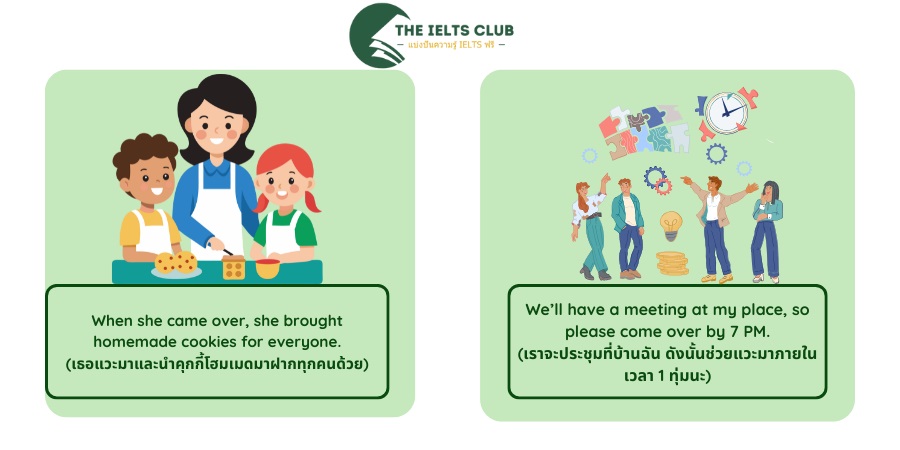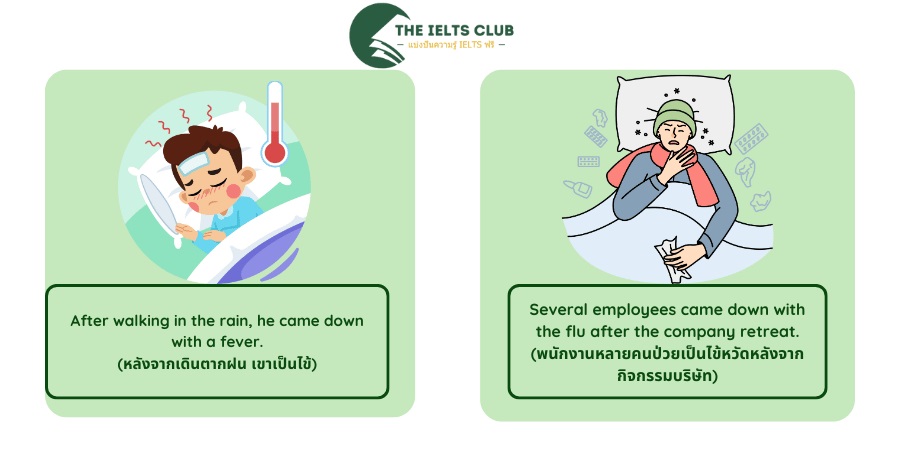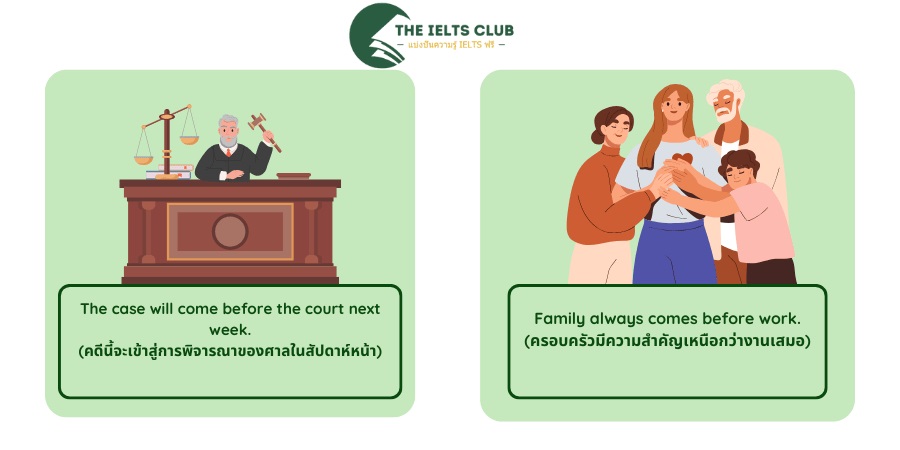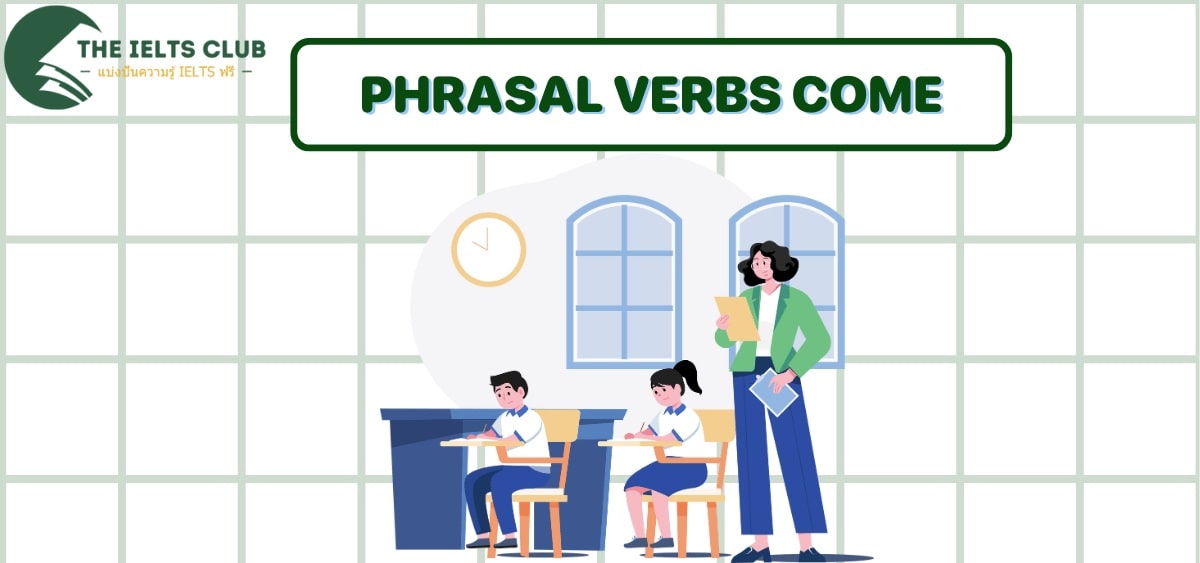เคยรู้สึกสับสนกับการใช้ภาษาอังกฤษที่ดูเหมือนจะซับซ้อนไหมคะ? Phrasal verbs come ก็เป็นอีกหนึ่งความท้าทายที่หลายคนต้องเผชิญ! ในบทความนี้ เราจะพาคุณไปสำรวจโลกของ Phrasal Verbs ที่น่าสนใจเหล่านี้ พร้อมตัวอย่างที่จะช่วยให้คุณเข้าใจและนำไปใช้ได้อย่างคล่องแคล่ว
I. คำว่า “Come” หมายถึงอะไร?
คำว่า “Come” เป็นคำกริยาที่ใช้บ่อยในภาษาอังกฤษ มีความหมายพื้นฐานว่า “มาถึง” หรือ “เคลื่อนที่เข้ามา” อย่างไรก็ตาม เมื่อรวมกับคำบุพบทหรือคำวิเศษณ์ คำว่า “Come” สามารถเปลี่ยนความหมายไปอย่างหลากหลาย เช่น การสื่อถึงการพบเจอ การกลับมา หรือการเริ่มต้นบางสิ่งในบริบทต่าง ๆ
II. รวม 30+ Phrasal Verbs Come ที่ใช้บ่อย
1. Come over (to)
ความหมาย: แวะมาเยี่ยมหรือมาหาที่บ้าน
ตัวอย่าง:
- When she came over, she brought homemade cookies for everyone.
(เธอแวะมาและนำคุกกี้โฮมเมดมาฝากทุกคนด้วย) - We’ll have a meeting at my place, so please come over by 7 PM.
(เราจะประชุมที่บ้านฉัน ดังนั้นช่วยแวะมาภายในเวลา 1 ทุ่มนะ)

2. Come down to
ความหมาย: สรุปหรือเกี่ยวข้องกับสิ่งสำคัญ
ตัวอย่าง:
- The decision will come down to what the majority prefers.
(การตัดสินใจขึ้นอยู่กับสิ่งที่คนส่วนใหญ่ชอบ) - It all comes down to trust when forming a strong partnership.
(ทุกอย่างขึ้นอยู่กับความไว้วางใจเมื่อสร้างความร่วมมือที่เข้มแข็ง)
3. Come down on somebody
ความหมาย: ตำหนิหรือวิจารณ์ใครบางคนอย่างรุนแรง
ตัวอย่าง:
- The teacher came down on the students for not doing their homework.
(ครูตำหนินักเรียนเพราะไม่ได้ทำการบ้าน) - His parents came down on him for spending too much money on gadgets.
(พ่อแม่ตำหนิเขาเพราะใช้เงินมากเกินไปกับอุปกรณ์ไอที)
4. Come round
ความหมาย: ฟื้นตัวหรือเปลี่ยนใจ
ตัวอย่าง:
- After a lot of discussions, he finally came round to our way of thinking.
(หลังจากการถกเถียงมากมาย ในที่สุดเขาก็เปลี่ยนใจและยอมรับวิธีคิดของเรา) - She was unconscious for a few minutes, but she came round quickly.
(เธอหมดสติไปไม่กี่นาที แต่ฟื้นตัวได้อย่างรวดเร็ว)
5. Come down
ความหมาย: ลดระดับหรือราคาลดลง
ตัวอย่าง:
- The old building came down after the storm destroyed its foundation.
(อาคารเก่าถูกทำลายลงหลังจากพายุพังฐานราก) - The festival ticket prices have come down, making them affordable for everyone.
(ราคาตั๋วเทศกาลลดลง ทำให้ทุกคนสามารถซื้อตั๋วได้)
6. Come down with
ความหมาย: ป่วยด้วยโรค
ตัวอย่าง:
- After walking in the rain, he came down with a fever.
(หลังจากเดินตากฝน เขาเป็นไข้) - Several employees came down with the flu after the company retreat.
(พนักงานหลายคนป่วยเป็นไข้หวัดหลังจากกิจกรรมบริษัท)

7. Come up against
ความหมาย: เผชิญหน้ากับปัญหาหรืออุปสรรค
ตัวอย่าง:
- The team came up against fierce competition in the finals.
(ทีมเผชิญหน้ากับการแข่งขันที่ดุเดือดในรอบชิงชนะเลิศ) - We came up against unexpected delays during the project.
(เราเจอความล่าช้าที่ไม่คาดคิดในระหว่างโครงการ)
8. Come out
ความหมาย: ออกมาหรือถูกเปิดเผย
ตัวอย่าง:
- The new book by the author will come out next month.
(หนังสือเล่มใหม่ของผู้เขียนจะออกวางจำหน่ายเดือนหน้า) - The truth came out during the press conference.
(ความจริงถูกเปิดเผยในระหว่างงานแถลงข่าว)
9. Come out with
ความหมาย: เปิดตัวผลิตภัณฑ์หรือไอเดียใหม่
ตัวอย่าง:
- The company will come out with a new product line this quarter.
(บริษัทจะเปิดตัวผลิตภัณฑ์ใหม่ในไตรมาสนี้) - She came out with a surprising announcement at the meeting.
(เธอประกาศเรื่องที่น่าประหลาดใจในที่ประชุม)
10. Come about
ความหมาย: เกิดขึ้น
ตัวอย่าง:
- A peaceful resolution came about after weeks of negotiation.
(การแก้ปัญหาอย่างสงบเกิดขึ้นหลังจากการเจรจาหลายสัปดาห์) - The change in the schedule came about due to unforeseen circumstances.
(การเปลี่ยนแปลงตารางเวลาเกิดขึ้นเพราะเหตุการณ์ที่ไม่คาดคิด)
11. Come across somebody/ something
ความหมาย: บังเอิญเจอหรือพบกับบางสิ่ง/บางคน
ตัวอย่าง:
- I came across an interesting book while browsing the library.
(ฉันบังเอิญเจอหนังสือที่น่าสนใจขณะค้นหาที่ห้องสมุด) - She came across her old friend at the market yesterday.
(เธอบังเอิญเจอเพื่อนเก่าที่ตลาดเมื่อวานนี้)
12. Come up
ความหมาย: เกิดขึ้นหรือถูกกล่าวถึง
ตัวอย่าง:
- The topic of climate change came up during the meeting.
(หัวข้อการเปลี่ยนแปลงสภาพภูมิอากาศถูกยกขึ้นมาในที่ประชุม) - A job opportunity has come up at the company.
(มีโอกาสงานใหม่เกิดขึ้นที่บริษัท)

13. Come up with
ความหมาย: คิดหรือเสนอไอเดีย/วิธีแก้ไข
ตัวอย่าง:
- She came up with a brilliant idea for the project.
(เธอคิดไอเดียที่ยอดเยี่ยมสำหรับโครงการนี้) - They came up with a solution to the problem.
(พวกเขาเสนอวิธีแก้ไขปัญหาได้สำเร็จ)
14. Come along/ on
ความหมาย: มาถึง/ดำเนินไปได้ดี
ตัวอย่าง:
- How’s your new business coming along?
(ธุรกิจใหม่ของคุณดำเนินไปอย่างไรบ้าง?) - Come on! We’re going to be late!
(มาเร็ว! เราจะสายแล้ว!)
15. Come off
ความหมาย: ประสบความสำเร็จหรือเกิดขึ้นจริง
ตัวอย่าง:
- The party came off perfectly despite the rain.
(งานเลี้ยงดำเนินไปได้อย่างสมบูรณ์แบบแม้ว่าฝนจะตก) - His plan didn’t come off as expected.
(แผนของเขาไม่สำเร็จตามที่คาดหวัง)
16. Come apart
ความหมาย: แตกออกหรือแยกออกจากกัน
ตัวอย่าง:
- The toy came apart after the kids played with it.
(ของเล่นชิ้นนั้นแตกออกหลังจากเด็ก ๆ เล่นมัน) - His old shoes are coming apart at the seams.
(รองเท้าคู่เก่าของเขากำลังจะหลุดออก)
17. Come aboard
ความหมาย: ขึ้นเรือ/เครื่องบิน/ร่วมเป็นส่วนหนึ่งของทีม
ตัวอย่าง:
- The passengers came aboard the cruise ship before it set sail.
(ผู้โดยสารขึ้นเรือสำราญก่อนที่มันจะออกเดินทาง) - We are excited to have you come aboard our team!
(เรารู้สึกตื่นเต้นที่คุณได้เข้าร่วมทีมของเรา!)
18. Come after somebody
ความหมาย: ตามหรือไล่ตามใครบางคน
ตัวอย่าง:
- The dog came after me when I entered the yard.
(หมาไล่ตามฉันเมื่อฉันเข้ามาในสวน) - The police are coming after the suspect.
(ตำรวจไล่ตามผู้ต้องสงสัย)
19. Come again
ความหมาย: ขอให้พูดซ้ำอีกครั้ง
ตัวอย่าง:
- Come again? I didn’t catch what you said.
(พูดอีกครั้งได้ไหม? ฉันไม่ได้ยินสิ่งที่คุณพูด) - Could you come again with that last point?
(คุณช่วยพูดประเด็นสุดท้ายอีกครั้งได้ไหม?)
20. Come at
ความหมาย: โจมตีหรือตรงเข้าหา
ตัวอย่าง:
- He came at me with a stick in his hand.
(เขาตรงเข้าหาฉันพร้อมกับถือไม้ในมือ) - The tiger came at its prey silently.
(เสือโจมตีเหยื่ออย่างเงียบเชียบ)
21. Come away
ความหมาย: ออกจากสถานการณ์/สถานที่
ตัวอย่าง:
- We came away from the trip with unforgettable memories.
(เรากลับมาจากการเดินทางพร้อมกับความทรงจำที่ลืมไม่ลง) - The paint came away from the wall easily.
(สีหลุดออกจากผนังได้ง่ายดาย)
22. Come back
ความหมาย: กลับมา
ตัวอย่าง:
- She came back from her vacation yesterday.
(เธอกลับมาจากวันหยุดเมื่อวานนี้) - Memories of childhood came back to him when he visited his old home.
(ความทรงจำในวัยเด็กกลับมาเมื่อเขาไปเยี่ยมบ้านเก่า)

23. Come by
ความหมาย: แวะมาหรือหาบางสิ่งได้มา
ตัวอย่าง:
- Why don’t you come by my office later?
(ทำไมคุณไม่แวะมาที่ออฟฟิศฉันทีหลังล่ะ?) - It’s hard to come by good jobs these days.
(ในปัจจุบันการหางานที่ดีเป็นเรื่องยาก)
24. Come clean
ความหมาย: เปิดเผยความจริง
ตัวอย่าง:
- He finally came clean about the money he stole.
(ในที่สุดเขาก็เปิดเผยความจริงเกี่ยวกับเงินที่เขาขโมย) - You need to come clean if you want to earn their trust.
(คุณต้องบอกความจริงหากคุณต้องการให้พวกเขาไว้ใจ)
25. Come forward
ความหมาย: เสนอตัวหรือให้ข้อมูล
ตัวอย่าง:
- The witness came forward with new evidence.
(พยานเสนอตัวพร้อมกับหลักฐานใหม่) - Nobody came forward to claim the lost wallet.
(ไม่มีใครเสนอตัวมาเพื่อรับกระเป๋าเงินที่หายไป)
26. Come from
ความหมาย: มีต้นกำเนิดมาจาก
ตัวอย่าง:
- She comes from a small town in Thailand.
(เธอมาจากเมืองเล็ก ๆ ในประเทศไทย) - This dish comes from traditional Thai cuisine.
(จานนี้มีต้นกำเนิดมาจากอาหารไทยดั้งเดิม)
27. Come in
ความหมาย: เข้ามา/มีบทบาท
ตัวอย่าง:
- Please come in and have a seat.
(เชิญเข้ามาและนั่งลง) - Your expertise will come in handy for this project.
(ความเชี่ยวชาญของคุณจะมีประโยชน์สำหรับโครงการนี้)
28. Come in for (sth)
ความหมาย: ได้รับบางสิ่ง (โดยเฉพาะคำวิจารณ์)
ตัวอย่าง:
- The company came in for criticism over its policies.
(บริษัทถูกวิจารณ์เกี่ยวกับนโยบายของมัน) - He came in for a lot of praise for his performance.
(เขาได้รับคำชมมากมายจากการแสดงของเขา)
29. Come into
ความหมาย: ได้รับมรดกหรือเข้าสู่สถานการณ์
ตัวอย่าง:
- She came into a large inheritance after her father’s death.
(เธอได้รับมรดกก้อนใหญ่หลังจากพ่อของเธอเสียชีวิต) - The new rules come into effect next month.
(กฎใหม่จะเริ่มมีผลในเดือนหน้า)
30. Come before something
ความหมาย: มาถึงก่อน/มีความสำคัญกว่า
ตัวอย่าง:
- The case will come before the court next week.
(คดีนี้จะเข้าสู่การพิจารณาของศาลในสัปดาห์หน้า) - Family always comes before work.
(ครอบครัวมีความสำคัญเหนือกว่างานเสมอ)

31. Come between
ความหมาย: ทำให้เกิดความขัดแย้ง
ตัวอย่าง:
- Don’t let this argument come between us.
(อย่าปล่อยให้การโต้แย้งนี้มาทำให้เราแตกแยก) - Money issues often come between family members.
(ปัญหาเรื่องเงินมักทำให้สมาชิกในครอบครัวมีความขัดแย้งกัน)
32. Come on
ความหมาย: เร็ว ๆ นี้/แสดงออก
ตัวอย่าง:
- Come on, let’s get going!
(เร็วเข้า ไปกันเถอะ!) - A headache came on suddenly in the afternoon.
(อาการปวดหัวเกิดขึ้นอย่างฉับพลันในช่วงบ่าย)
อ้างอิง: Phrasal Verbs Break
III. แบบฝึกหัดเกี่ยวกับ Phrasal Verbs กับ Come
แบบฝึกหัดที่ 1: เติมคำในช่องว่าง
เติมคำในช่องว่างด้วย Phrasal Verb ที่ถูกต้องจากในวงเล็บ:
(come across, come up with, come back, come down, come forward)
- After hours of brainstorming, she finally _______ a brilliant idea for the project.
- He _______ a strange artifact while exploring the old attic.
- The government is urging witnesses to _______ with any information they have.
- The prices of electronics usually _______ after the holiday season.
- She promised to _______ to visit her family next summer.
เฉลยคำตอบ:
- came up with
- came across
- come forward
- come down
- come back
แบบฝึกหัดที่ 2: เลือกคำตอบที่ถูกต้อง
เลือก Phrasal Verb ที่ถูกต้องเพื่อเติมประโยค:
- I _______ an old diary while cleaning the basement.
a) came by
b) came across
c) came forward - The truth will _______ eventually, no matter how hard you try to hide it.
a) come back
b) come out
c) come down - She _______ her old friend unexpectedly at the cafe.
a) came up with
b) came into
c) came across - He _______ with a fever after being out in the rain.
a) came down
b) came down with
c) came after - Can you _______ with a solution to this issue?
a) come back
b) come up
c) come up with
เฉลยคำตอบ:
1 – b) came across
2 – b) come out
3 – c) came across
4 – b) came down with
5 – c) come up with
การเรียนรู้ Phrasal Verbs กับ “Come” เป็นวิธีที่ดีในการเพิ่มพูนทักษะภาษาอังกฤษ เพราะสามารถนำไปใช้ในบริบทที่หลากหลาย เช่น การสนทนาในชีวิตประจำวัน การเขียนเชิงวิชาการ และการสอบภาษาอังกฤษระดับต่าง ๆ อย่าลืมฝึกฝนอย่างสม่ำเสมอและลองใช้ในประโยคจริงเพื่อให้เกิดความคล่องแคล่ว!











